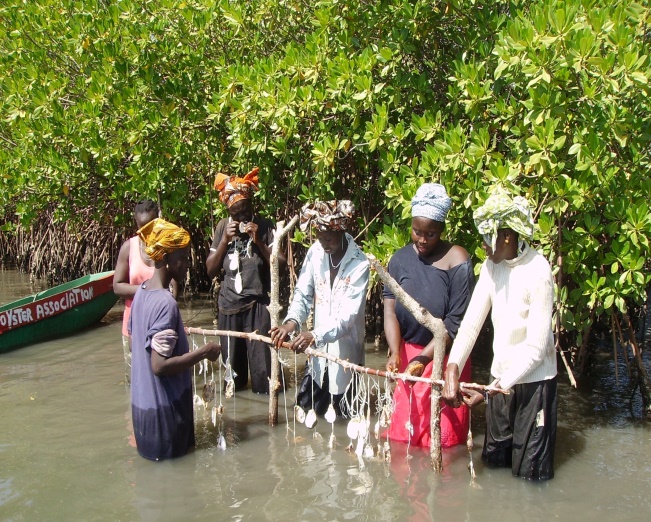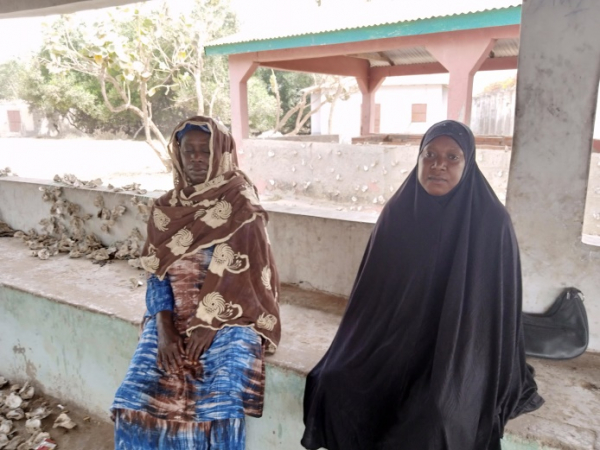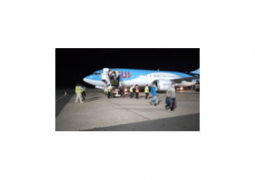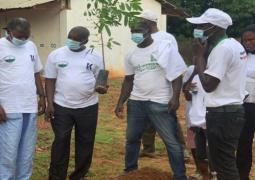
However, since the country registered the first covid-19 case on March 17th 2020, the lucrative business for women especially those living at the coastal towns have had their incomes drastically reduced due to the deadly pandemic. Their savings have also been affected. For many of the women that are into the business, their living conditions are becoming more deplorable.
Oysters are traditionally collected from the roots of mangroves, using rudimentary tools such as machetes. The work is physically demanding and exposes harvesters to a high degree of risk. Many women harvesters cannot swim, making collection activities in small canoes (without lifejackets).
Most of the farmers at Kartong, a peri-urban coastal town in the Kombo South District of West Coast Region, lack appropriate gloves and footwear; hence they are exposed to injuries among others. But even with these injuries, coupled with lack of storage facilities to keep their products, these women farmers are determined to go the extra mile in order to get their oyster.
Mba Awa Sanyang, a resident of Kartong, who doubles as the president of Try-Oyster Association at the community, lamented difficulties they encountered during the covid-19 period. The association, she said, comprises over 50 women and it was established 20 years ago.
Their businesses, she added, were not flourishing as usual especially during the lockdown and State of Emergency that was declared by the government as measures to halt the spread of the virus. “At some point, even the little things we contribute to our families become a problem due to the fact that what we sell at the market would finish. Most of our customers were not coming to the Market amid the fear of getting the virus.”
Mrs. Sanyang disclosed: “Whenever we sold our oysters, we would get about D2000 to 5000 dalasis depending on the quantity we sold. If we sold our entire products at the Brikama Market or Serrekunda Market, we usually got huge profits. However, during the covid-19, what we’re getting less than the amount of money that we used to have before the advent of the virus.”
“The money that we used to get in our business is what we used to pay our children's school fees and also contribute in helping our husbands in terms of feeding among others.
I can clearly tell you that the coming of covid-19 in the country has increased poverty within our households. We are no longer earning as what we used to get before.”
“At some point, we were not even going to the river side due to many factors; among which is the lack of canoes and also people fear of getting the virus through contacting each other,” she stated.
“The lack of jackets and gloves was among the issues affecting us so much. If you look at our hands, we sustain injuries everywhere.”
“What even helps us a little bit is the fact that the government closed schools as measures to halt the spread of the virus. I can clearly tell you without that, most of our children would have dropped out of school because of school fees.”
“The little that we gained from the business before the State of Emergency is what we use to buy food stuffs in order to complement the efforts of our husbands. This year, we are not working because some people claimed that there are no oysters in the river,” she revealed.
“However, what surprised us is the fact that other women on the other side of the river are still working.”
“We have an account at the bank and we save about D40, 000. However, since the start of covi-19, we couldn’t save anything for our account. The little we get on a daily basis goes to our families’ needs.”
Isatou Jambang, also from Kartong, also bewailed the difficulties they are encountering as a result of the covid-19, claiming that they couldn’t get their needs and that of their families due to the fact that their oyster business was badly affected by pandemic.
She added: “Most of the products that we sell at the market don’t finish now. However, before the virus comes into the country, we would sell everything. At the moment, our business is even on hold because we’re not allowed to go to the riverside.”
“What we need at the moment is materials that we can use for our work. If you don’t have the right materials, you can’t get the needed products. We also need boats and Ice plants where we can store our products. Currently, when we sell our products most of it won’t finish, and without a storage facility, they end up being spoiled.”
Babucarr M. Kanteh, the Ward Councillor of the area recalled that sometime before the Holy Month of Ramadan, the Senegalo-Gambia Federation donated some materials; wheel-barrows among others items geared towards complementing their efforts in harvesting oysters.
The donation, he maintained, was facilitated by the ward committee. “What we are trying to do now is to organise a mini-donors conference with a view to ensure all other individuals, ranging from women and youths and other groups within our ward are empowered in whatever they’re doing and to also ensure that others that are not employees are supported.”
At the council level, Kanteh said, they have a budget for Women and Children Affairs. “There’s an allocation for that. Therefore, any group within the region can apply in order to get access to those funds. We will, however, try to see how best we could help women that are involved in the oyster business because they encounter so many difficulties before they get these items.”




